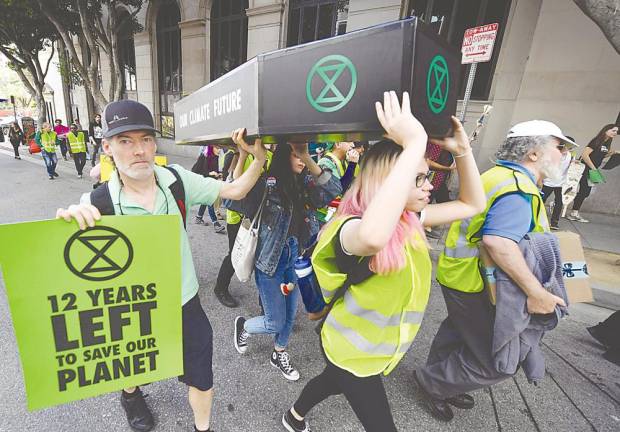‘The Garden of Eden is no more’
Emeritus Professor Tan Sri Dato' Dzulkifli Abdul Razak
My View - The Sun Daily
January 27, 2019

Protesters in Los Angeles call for action on Saturday. – AFPpix
THE appearance of Sir David Attenborough, 92, at the recent World Economic Forum (WEF) and his warning that “the Garden of Eden is no more” brings out a new metaphor in the understanding of what climate change is all about. And more so the “catastrophe” that is said to follow should climate change be not dealt with urgency as warned.
The WEF conventionally is a gathering that brings together personalities from big business (in cahoots with unscrupulous politicians) often held accountable for issues related to global warming. Among them are some of the most notorious global polluters allegedly “preaching” to the world how to create what they term a better future. This time however the situation was rather different in that they were reminded to make “a renewed push to tackle climate change before the damage is irreparable”.
Indeed much of the blame could be firmly laid at their doors which have been opened wide to a variety of human-related activities that eventually pitch the world into an era that threatens to undermine its own civilisation. That era is dubbed as Anthropocene – the age of humans. In fact, Naomi Orekes and Eric Conway explicitly implied this in their book: The Collapse of the Western Civilisation.
In this regard, Attenborough was right when he said: “I am quite literally from another age,” referring to the Holocene era put at some 12,000 years period of climatic stability that allowed humans to create their own civilisations through exchanges of ideas and goods, leading to a globally interconnected species as we see today.
The Holocene is what Attenborough figuratively referred to the Garden of Eden that has now “changed” drawing a close parallel to the biblical version as we know it, namely, transgression of a prescribed set of laws resulting in humans having to pay a high price when they were deprived of a civilisation they deserved.
In similar ways, humans have once again transgressed a set of (natural) laws and are now paying the price as their civilisation is being dismantled, to the extent that their species is endangered. Meaning the only conditions that humans have known over centuries are being gradually destroyed at the expense of their own survival.
Reportedly, a survey done before the forum found that environmental threats are now the biggest danger to the global economy, and concern is mounting that co-operation between countries on the issue is breaking down. This is an understatement by all counts when it is framed in mere economic terms away from human experience and survival. Blaming global tensions as holding back the climate change fight as WEF did is missing the point because climate change could well be the cause of global tensions taking into consideration the frequency and severity hitting ever larger segments of human populations.
Indeed, Attenborough admitted that “even he has been surprised by the speed of the damage caused to the environment during his career making TV programmes showing life on earth.” He said “If people can truly understand what is at stake, I believe they will give permission for business and govern-ments to get on with the practical solutions.”
The fact that this issue has not caught on with WEF until almost two decades into the 21st century indicated there are still gaps in its understanding. More tellingly was in 2016, when the UN General Assembly signed on to the Sustainable Development Goals for its members, yet WEF then busied itself with the so-called Fourth Industrial Revolution that got countries like Malaysia jumping into the bandwagon. The same consideration was not accorded to issues on sustainability and education for sustainable development or Education 2030. Instead Education 4.0 which is by and large unsustainable to say the least becomes our mantra.
In essence what Attenborough was alluding to is what many have been saying for several years – but somehow got “frozen” in the sub-zero ambient of the Davos meetings. The hard-hitting message is that the current economic model (so also the education and politics that promote it) is no longer relevant and needs to be “revolution-ised.”
He was spot on when recounting: “Growth is going to come to an end, either suddenly or in a controlled way.” This he jokingly reiterated by citing an adage that anyone who thinks of having infinite growth in finite circumstances is “either a madman or an economist”.
By extension, the gathering of the latter to promote the same adage cannot be any saner either. Attenborough has just driven the last nail on the WEF coffin pointing out that “some delegates have more power than a nation state”– a testimony that Oxfam has been sharing for many years to coincide with the previous WEFs but to no avail. “Unless we sort ourselves out in the next decade or so we are dooming our children and ograndchildren to an appalling future.”
It is time for the World Economic Forum to be pressured to change into an ecological one.
